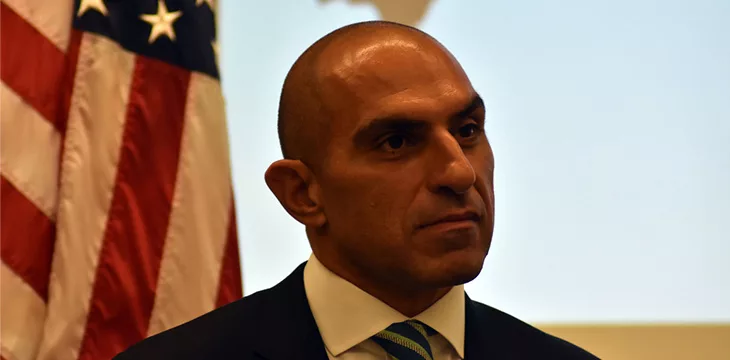|
Getting your Trinity Audio player ready...
|
The chair of the Commodity Futures Trading Commission (CFTC), Rostin Behnam, has said that decentralized digital asset exchanges will be regulated regardless of how they’re constituted—it’s just a matter of whether the CFTC or the Securities and Exchange Commission (SEC) does it.
Benham made the comments at the annual International Swaps and Derivatives Association’s annual general meeting, where he recorded a conversation for Bloomberg’s Odd Lots podcast.
“It’s easy to suggest ‘Oh, there’s no institution, there’s no individual, it’s just code, you can’t regulate that, it’s self-effectuating,’ but that really is the wrong set of questions,” he said.
“It’s really about what are U.S. customers being offered and exposed to? And who is either the individual or group of individuals who set up that entity, that code, to offer those products?”
Benham’s comments harken to a burgeoning awareness that decentralization is not the get-off-of-regulatory-jail-free card it’s often pitched as. Where ‘decentralized’ is often used as a way for those spearheaded digital asset projects to absolve themselves of responsibility for what they’re creating, the reality is that there is usually centralized power somewhere.
The CFTC drew attention to this in October, when it successfully served the members constituting Ooki DAO with an enforcement action through the DAO’s chat box—a move later affirmed in the courts.
Perhaps that’s why Benham also pointed out that as a segue into the DeFi topic, his agency takes great pains to educate the market about how to stay on the right side of the law as far as the CFTC is concerned.
“We have done everything in our power to remain transparent and to engage with market participants in this digital asset DeFi space to ensure they know as much as they can about what the Commodity Exchange Act requires, and what is required of them if they are going to offer futures, options or swaps to U.S. customers,” he stated.
Throughout the rest of the interview, Benham provided enlightening comments on how he views digital asset regulation, particularly the role played by the CFTC.
For instance, he was asked to weigh in on the ongoing debate about which regulator within the U.S. should be responsible for digital asset regulation between the CFTC and the SEC. His answer was relatively non-committal, but he did point out that the U.S. has a unique system of financial regulators that have been built up over decades, often in response to crises in the U.S. monetary system and financial markets. It is this slow build-up that has, for example, led to the existence of two financial regulatory agencies with distinct responsibilities.
“As much as the crypto conversation presents new and novel issues and questions about the underlying asset—whether to regulate it, how to regulate it—I do think … we have to use the same playbook that we’ve used in the past as we think about policy we construct for crypto,” he noted.
Indeed, exactly how regulatory responsibilities are to be divvied up between the two has been the subject of much discussion in Congress as lawmakers begin to shape a new legal regime for digital assets in the United States.
Against that background, Benham had some interesting comments on his agency’s relationship with the SEC.
“A lot of the conversations we have is high-level, 30,000 ft, about what we’re thinking, what we’re seeing, who the registrant pool is that we’re starting to observe in the markets and how we need to approach this,” he said.
“Communication is frequent, it’s very transparent, and we have common interests across the U.S. government in terms of what we want to accomplish and how we want to accomplish it.”
The hosts asked Bernham what he made of the view that digital assets should remain outside the regulatory ringfence to separate them from the financial system and minimize contagion risk. This perspective has some support within the joint Financial Services-Agriculture Subcommittee, which is holding a series of public hearings on the future of digital asset regulation in the U.S. and which discussed the subject at a recent hearing.
Bernham appeared critical of that position:
“We all know individuals who were hurt in last year’s turmoil in the crypto markets. It is a largely unregulated market notwithstanding some state-level requirements. I do think my responsibility within the context of the mission of the CFTC is to protect investors, and when it comes to commodity financial assets which many of these tokens are, I have to do everything I can with the power I have as the chair of the CFTC to ensure that U.S. customers are protected.”
Later, one of the hosts asked Bernham about Binance, which was sued by the CFTC back in March for what it called ‘calculated’ violations of U.S. regulations. The host remarked that the CFTC’s complaint was entertaining in that it contained numerous internal Binance communications, which show staff at the exchange openly flouting their obligations under U.S. law.
“It’s not our intention to entertain… Nothing surprises me anymore… we know there’s a lot of individuals out there who don’t want to comply with the law, choose to evade the law or don’t know about the law—and sometimes they will do things that are surprising, including writing this stuff down,” he remarked.
Watch: SEC Commissioner Hester Peirce on Bitcoin Association’s Blockchain Policy Matters

 07-01-2025
07-01-2025 





